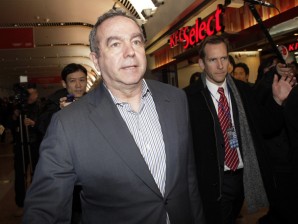US envoy visits China after Kim Jong Il’s death
BEIJING—Senior US and Chinese diplomats on Wednesday discussed North Korea following leader Kim Jong Il’s death and whether that will delay resuming talks on the country’s nuclear disarmament and deliveries of US food aid.

US Assistant Secretary for East Asian and Pacific Affairs, Kurt Campbell, walks out from the arrival hall at Beijing airport Tuesday in Beijing, China. Campbell arrived in China on a tour that will also take him to South Korea and Japan to discuss developments in North Korea after the death of Kim Jong Il. AP
Assistant Secretary of State Kurt Campbell is the highest level US official to visit the region since Kim’s unexpected death two weeks ago raised new concerns about poor, nuclear-equipped North Korea’s stability and disrupted US-North Korean talks just as they were making headway.
Campbell met Wednesday with Chinese Vice Foreign Minister Cui Tiankai and was due to meet with other senior officials and Chinese scholars before flying to South Korea later in the day.
Also on the agenda in Beijing were discussions about the Obama administration’s tentatively warming relations with Myanmar, which has relied heavily on Chinese trade, investment and diplomatic support.
Like Myanmar, North Korea has become dependent in recent years on Chinese diplomatic protection and economic largesse. Following Kim’s death and with a transition to his son Kim Jong Un under way, senior Chinese officials have urged Washington not to take any actions that might provoke Pyongyang or destabilize the impoverished country — a message diplomats said was likely to be repeated in Campbell’s meetings.
In the past two years, tensions spiraled in the region as North Korea conducted a nuclear test and shelled a South Korean island among other provocations. In recent months, Washington and Pyongyang have held quiet negotiations and were nearing agreements on resuming US food aid when Kim died.
Article continues after this advertisementThat agreement was seen as a first step toward restarting the stalled disarmament talks, which also include China, Japan, South Korea and Russia. Pyongyang has cast doubt over whether those negotiations may be quickly restored. Its powerful National Defense Commission released a hardline statement over the weekend saying North Korea would never deal with South Korean President Lee Myung-bak